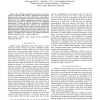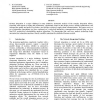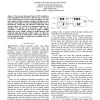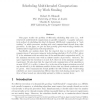395 search results - page 46 / 79 » Optimizing Communication Scheduling Using Dataflow Semantics |
128
click to vote
EAAI
2007
15 years 2 months ago
2007
Multi-agent systems are widely used to address large-scale distributed combinatorial applications in the real world. One such application is meeting scheduling (MS), which is deï¬...
106
click to vote
GLOBECOM
2009
IEEE
15 years 9 months ago
2009
IEEE
âWe investigate distributed channel-aware random access for networks with arbitrary topologies and trafï¬c distributions, where users can receive trafï¬c from or send trafï¬c ...
96
Voted
DATE
2006
IEEE
15 years 8 months ago
2006
IEEE
Systems integration is a major challenge in many industries. Systematic analysis of the complex integration effects, especially with respect to timing and performance, significant...
92
Voted
INFOCOM
2009
IEEE
15 years 8 months ago
2009
IEEE
â The Capacity Allocation Paradox (CAP) destabilizes a stable small-buffer network when a link capacity is increased. CAP is demonstrated in a basic 2x1 network topology. We show...
FOCS
1994
IEEE
15 years 6 months ago
1994
IEEE
This paper studies the problem of e ciently scheduling fully strict (i.e., wellstructured) multithreaded computations on parallel computers. A popular and practical method of sche...




